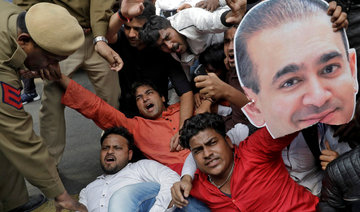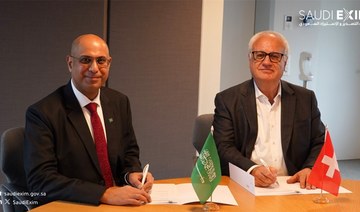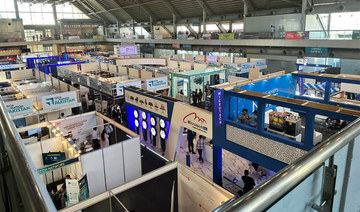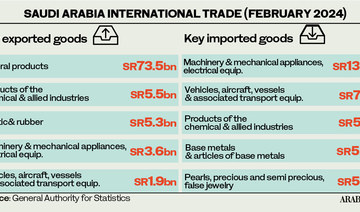NEW DELHI: Indian billionaire jeweler Nirav Modi, one of the prime accused in the country’s largest ever bank fraud, denies allegations leveled against him by Punjab National Bank (PNB), his lawyer said on Tuesday.
“There is nothing, there is nothing in it,” Vijay Aggarwal, a lawyer representing Modi told Reuters, referring to a police complaint filed by the state-run bank that said companies linked to the jeweler and his relatives received credit worth close to $1.8 billion between 2011 and 2017 using false guarantees supplied by two bank officials.
Aggarwal, speaking by telephone, declined to comment on Modi’s whereabouts. Indian officials are on the lookout for Modi and his family, who police said left India in January prior to the case being filed.
“Everything is documented,” Aggarwal said of Modi’s dealings with PNB, adding that the bank had regularly levied fees on its dealings with the jeweler’s firms.
According to the police complaint, the two officials at a Mumbai branch of PNB fraudulently steered credit to firms linked to Modi and entities tied to jewelry retailer Gitanjali Gems, led by Modi’s uncle, Mehul Choksi.
“They’re covering themselves up,” Aggarwal said referring to the PNB complaint. “They want to avoid liability ... that is why they are cooking up this story.”
Asked about his legal strategy, Aggarwal said: “While there’s no chargesheet, there’s no strategy. When there’s a chargesheet, there will be a strategy.”
Choksi, who has also left the country, has not commented on the matter. Gitanjali, in a regulatory filing, denied Choksi’s involvement in the alleged fraud.
PNB did not immediately respond to the lawyer’s comments.
Separately, in a letter to PNB officials, Modi stated that his companies owe the bank under 50 billion rupees ($775.25 million), much lower than the amount alleged by the bank. He also said PNB has jeopardized its chances of recovering the sums owed by going public with its allegations.
“The erroneously cited liability resulted in a media frenzy which led to immediate search and seizure of operations, and which in turn resulted in Firestar International and Firestar Diamond International effectively ceasing to be going-concerns,” he wrote in a letter seen by Reuters. “This jeopardized our ability to discharge the dues of the group to the banks.”
Both companies are controlled by Modi. The fraud allegedly involves at least three firms controlled by Modi and other firms owned by Choksi.
“Your actions have destroyed my brand and the business and have now restricted your ability to recover all the dues,” said Modi in the letter, accusing PNB of acting in haste and noting that his firm had always been current on paying its dues.
Five bank officials, including the two at the Mumbai branch, have been arrested so far.
The alleged fraud occurred as one PNB deputy manager, with the assistance of one or more colleagues, issued more than 100 fraudulent Letters of Undertaking, guarantees sent to other banks so that they would provide loans to a customer.
After entering the transactions on the SWIFT messaging system, the official, who worked at the same branch from 2010 to 2017 despite normal bank practices of regular rotations — did not record them on PNB’s internal system, according to the bank’s complaint.
A PNB source said on Tuesday that all its branches have now been asked to reconcile SWIFT messages with entries in their core banking system going back eight or nine years.
The bank has also asked branches to ensure no clerical staff stay in one office for more than five years, and officers no more than three years, the source said.
The fraud case has stunned financial markets and sent PNB shares tumbling for a fifth straight trading day, losing more than a quarter of its market value since disclosing the fraud.
Ratings agency Fitch placed the bank on negative watch. Later, Moody’s also placed PNB’s ratings under review for a downgrade.
“PNB’s capital position would deteriorate markedly, and fall below minimum regulatory requirements, if the bank is required to provide for the entire (fraud) exposure,” Moody’s said in a note on Tuesday.
Billionaire jeweler denies huge Indian bank fraud
Billionaire jeweler denies huge Indian bank fraud
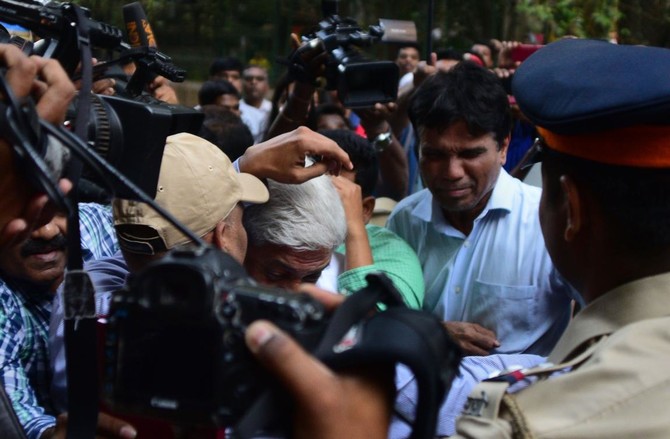
Saudi entrepreneurs among beneficiaries of $493m Social Development Bank support funding in Q1 2024

RIYADH: Almost 12,000 Saudi entrepreneurs received support and training from the Kingdom’s Social Development Bank in the first quarter of 2024, it was revealed.
Minister of Human Resources and Social Development Ahmed Al-Rajhi announced in a post on X that SDB provided financing worth SR1.85 billion ($493 million) in the first three months of this year.
The financing aims to “support individuals and enterprises to contribute to economic development and sustain efforts toward national sustainable growth.”
During the same period, assistance for small and startup businesses amounted to SR606 million for over 1,700 establishments.
Furthermore, empowerment support for vibrant and productive communities reached SR640 million, benefiting 12,000 citizens through various social developmental products, including marriage, family support, and restoration.
Assistance for freelancers and productive families also surged to SR600 million, benefiting 13,000 individuals.
Additionally, the number of savings accounts increased by 13,000, reaching a total of 245,000, with a balance exceeding SR525 million.
In January, SDB signed 24 deals worth SR1 billion to support entrepreneurs across various sectors in the Kingdom.
Inked during the Entrepreneurship and Modern Work Patterns Forum, the memorandums of cooperation encompassed a broad spectrum of sectors, including health, transportation, and logistics.
This aligns with the objectives of Vision 2030, aiming to reduce the unemployment rate, enhance women’s participation in the workforce, and expand the contribution of small and medium-sized enterprises to 35 percent of the gross domestic product by the end of the decade.
Speaking at the time, CEO of SDB Ibrahim Al-Rashid said those deals would “open new horizons for entrepreneurship and small and emerging enterprises" by developing new systems for financing, training and qualification.
Last year, the bank introduced a range of training programs to assist small businesses across the Kingdom.
The courses covered key areas such as marketing and administration, allowing business owners to meet and discuss their development plans with local and international experts.
Saudi biotechnology sector poised for double-digit growth: report

RIYADH: Saudi Arabia’s biotechnology and genomics sector is likely to record double-digit growth as it plans to invest 2.5 percent of its gross domestic product in research and development by 2040, aiming to add $16 billion to its economy.
This was highlighted in a recent report by US-based consulting firm Arthur D. Little, emphasizing the Kingdom’s substantial growth potential in the sector.
The study highlighted that the global biotech market, valued at $1.5 trillion in 2023, is projected to reach $4 trillion by 2030. This growth is driven by rising demand for improved healthcare and increased investment from both government and private sectors.
“Within this context, Saudi Arabia’s directed R&D investments, amounting to $3.9 billion in 2021 and aims to become a global leader in innovation and R&D, with annual investment equivalent to 2.5 percent of GDP by 2040 which are set to catalyze the expansion of the sector,” the report said.
It added: “This is expected to add $16 billion to the economy and create high-value jobs in science and technology, are set to catalyze the expansion of the sector, reinforcing its commitment to a knowledge-based economy.”
In 2022, Saudi Arabia’s investment in research and development soared to $5.1 billion, marking a 32.7 percent increase from the previous year, according to the General Authority for Statistics.
GASTAT’s report revealed that the government sector infused SR11.1 billion into R&D, constituting 58 percent of the nation’s total R&D budget.
Patrick Linnenbank, a partner in the healthcare and life sciences practice for Middle East & South East Asia at Arthur D. Little, emphasized the synchrony between strategic investments and the burgeoning demand for enhanced healthcare services.
“Our analysis indicates that strategic investments and initiatives are aligning with a growing demand for enhanced healthcare services and personalized medical treatment, which Saudi Arabia is well-positioned to fulfill,” Linnenbank said.
The report underscored the pivotal role of the Kingdom’s biotech and genomics initiatives, exemplified by the Saudi Genome Project 2.0 and collaborative endeavors. These initiatives are instrumental in propelling precision medicine forward, leveraging AI and genomics for personalized healthcare solutions.
Launched in 2018, the Saudi Genome Program utilizes cutting-edge genomic technologies to combat genetic diseases, advancing healthcare through improved diagnosis, treatment, and prevention.
Ankita Gulati highlighted the transformative potential of AI and genomics in healthcare, stating: “The confluence of genomic data and AI in healthcare is at the core of next-generation medical treatment and may revolutionize healthcare. Saudi Arabia’s current trajectory in genomics research and development is a robust indicator of its potential to lead in this domain.”
Integral to Saudi Arabia’s advancement in the biotech sphere are strategic collaborations with global pharmaceutical firms and the integration of research initiatives from key entities such as King Abdullah International Medical Research Center, King Abdullah University of Science and Technology, and King Abdulaziz City for Science and Technology.
The report also applauded the progressive establishment of a regulatory framework, with new guidelines from the Saudi Food and Drug Authority and legislative oversight from the Saudi Research Development and Innovation Authority.
While Saudi Arabia strides confidently toward leadership in the biotech landscape, the report acknowledged the necessity of further developing capabilities across the value chain.
The Kingdom’s accelerator and incubator programs, including KAIMRC’s Medical Biotechnology Park, KAUST’s Taqadam initiative, and the Biotech Startup Program in Dammam Valley, are pivotal in nurturing a thriving biotech and genomics ecosystem.
Saudi, US business ties set to reach new heights after high-level meeting
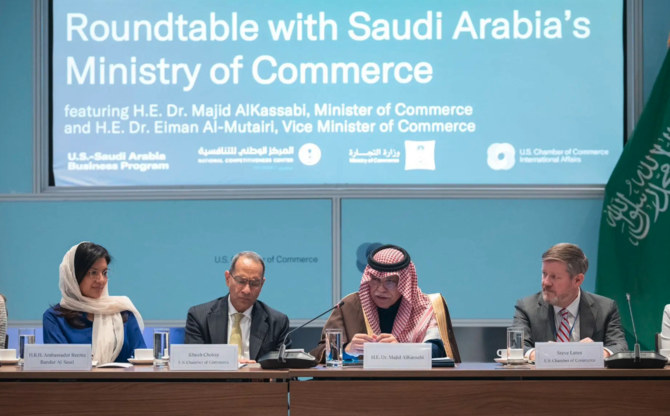
RIYADH: Trade relations between Saudi Arabia and the US are set to further prosper after a senior official from the Kingdom met with prominent business leaders.
Minister of Commerce Majid bin Abdullah Al-Qasabi held talks with representatives from the US Chamber of Commerce and prominent American companies in Washington, in which the robust economic connections between the two countries were emphasized.
Speaking to attendees, Al-Qasabi, who also serves as chairman of the board of directors of the National Competitiveness Center, highlighted the progress made so far in the Kingdom’s journey to achieve its ambitious plan for 2030, as reported by the Saudi Press Agency.
Al-Qasabi noted the transformations within the Saudi economy have spurred the emergence of new sectors and promising business opportunities.
Saudi Arabia fastest-growing IT market in region, ICT spending to hit $37.5bn in 2024
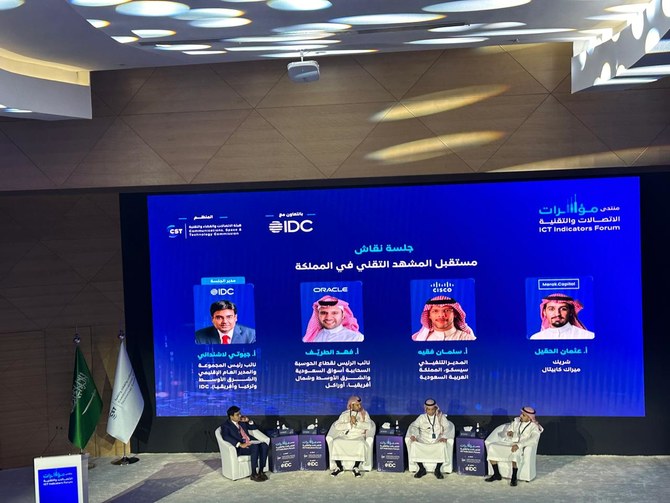
RIYADH: Saudi Arabia is the fastest-growing information technology market in the Middle East, Turkey, and the African region, with double-digit growth in technology spending, according to analysts.
Jyoti Lalchandani, regional managing director of research firm IDC, said wider information and communication technology market spending is expected to reach $37.5 billion by the end of 2024.
The comments were made during the ICT Indicators Forum, which was hosted by the Ministry of Communication and Information Technology alongside the Communications, Space, and Technology Commission in Riyadh on April 24.
It was further noted that spending in this area across the Saudi government sector would exceed $752 million by the end of 2024 as innovative technologies become foundational to building an “experience economy.”
“AI, big data analytics, IoT, and cybersecurity spending is poised for tremendous growth and will account for almost one-third of overall IT spending in Saudi Arabia in 2024. Spending on AI in Saudi Arabia will surpass $720 million in 2024, reaching $1.9 billion by 2027 at a CAGR (compound annual growth rate) of 40 percent—half of that will be on interpretative AI,” Lalchandani said.
“We have seen Saudi Arabia emerge as a hub for the cloud,” he added, with spending on public cloud forecasted to surpass $2.4 billion in 2024 and reach $4.7 billion by 2027.
Software-as-a-Service will account for more than 50 percent of the 2024 spending.
IDP further highlighted that spending on cybersecurity alone will surpass the $1 billion mark in 2024 and reach $1.6 billion in 2027.
“I do remember a few years ago, the cybersecurity market was estimated at about $500 million. Today, we’re talking about literally double that. We’re talking about $1 billion in the cybersecurity industry, and to hear it be called the fastest growing market in the region is really a testament to our beloved nation,” Salman Faqeeh, CEO of Cisco Saudi Arabia, said while speaking on a panel during the forum.
GCC oil companies can maintain solid credit metrics in net-zero journey: S&P Global

RIYADH: National oil companies in Gulf Cooperation Council countries could absorb the additional investments needed to transition toward net-zero while maintaining robust credit metrics, said S&P Global.
In its latest report, the credit rating agency noted that NOCs in the GCC face similar energy transition risks as their global counterparts, but their strong financial positions will help mitigate these impacts.
Rawan Oueidat, credit analyst at S&P Global Ratings, said: “We expect that GCC NOCs will have sufficient financial buffers and competitive advantages to absorb the incremental investments that are necessary to catch up with global peers and that they can preserve their credit ratios over the next five years.”
He added: “GCC NOCs’ average low-carbon investments would have to total $15 billion-$25 billion annually at least until 2026 to keep up with those of global listed peers. Even after factoring in these investments, the overall effect on NOCs’ debt to EBITDA (earnings before interest, taxes, depreciation, and amortization) would be below 2.0x on average.”
According to the report, these firms can fund most of their net zero projects without having to revert to external financing sources.
S&P Global added that both banks and capital markets will play a role in funding the regional countries’ energy transition.
“Given the size of the GCC banking systems and their capitalization, we expect they will have the capacity to cater for the funding needs of the NOCs’ low-carbon investments over the next few years if necessary,” stated the agency.
It added: “However, we observe that NOCs, which are generally among the largest and internally-focused corporates in the GCC countries, are typically financed outside the local banking systems.”
The report highlighted that while firms in the region benefit from strong balance sheets, they will need to carefully consider investment requirements in relation to dividend distributions.
It further noted that the majority of NOCs in the GCC have already established net-zero targets, with Saudi Aramco aiming to achieve this by 2050 and Abu Dhabi National Oil Co. targeting a goal by 2045.
S&P Global further noted that environmental, social, and governance disclosures among oil firms in the region have increased, particularly in disclosing scope 2 emissions, but still lag behind their global counterparts.
However, the report highlighted that most NOCs in the GCC have not yet disclosed scope 3 emissions.
Scope 2 refers to emissions released into the atmosphere from the use of purchased energy.
On the other hand, scope 3 encompasses indirect emissions in a company’s value chain, and it is generally considered complex and challenging to report.


